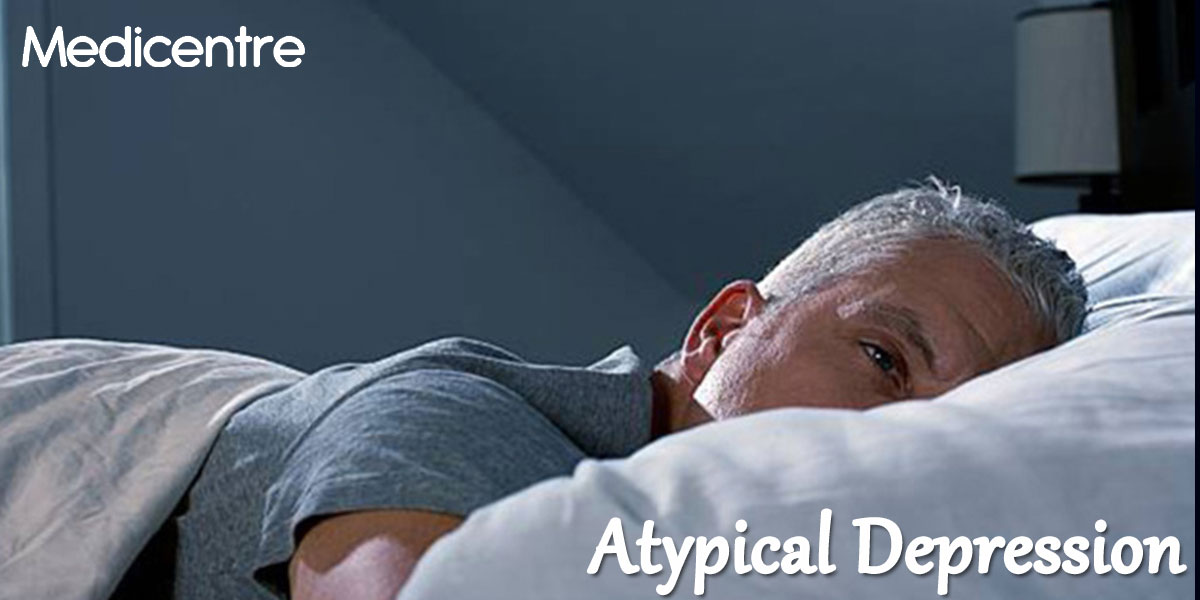Atypical Depression
Depression of any type can make a person feel sad and keep them away from enjoying their lifestyle. But, in case of Atypical Depression, there are certain symptoms which may occur and this includes weight gains, increased appetite, and sleepiness, heaviness in legs and arms and finding difficulty in marinating relationships.
During the teenage years, the condition of Atypical Depression starts and it is common amongst both women and men, but more common in women. Just similar to other types of anxiety and depression, Atypical Depression is treatable and the treatment includes medications, lifestyle changes and psychological counselling.

Symptoms of Atypical Depression!
As mentioned, people may experience feelings of sadness and reduced ability to enjoy life when they are surrounded by any type of depression. However, Atypical Depression has some unique and common types of symptoms which include:
- Enhanced appetite and hunger pangs with unintentional weight gains
- Depression which improvises with some good news and life events and again returns later
- Increased level of sleepiness which usually last for more than 10 hours a day
- Trouble in retaining longer lasting relationships because of sensitivity to rejection or criticism that affect the relationship and social life significantly
- Heaviness in legs and arms that last more than 60 minutes in a day
What are the Causes of Atypical Depression?
It is still not clear why Atypical Depression is caused in people. Apart from other types of depression a combination of other factors are involved and this includes:
- Inherited Traits – Depression is the common issue amongst the people who have someone in family with the same condition
- Brain Chemistry – The brain chemicals like neurotransmitters play a crucial role in causing depression. When the amount of this chemical in brain increases or becomes out of control, it may cause depression symptoms
- Life events – loss of loved ones, high stress and financial problems may also trigger Atypical Depression
- Traumatic events in childhood like loss of parents, abuse of parents may also cause changes in brain and may lead to Atypical Depression
Risk Factors and Complications
There are a variety of factors that are known to increase the chance of developing Atypical Depression and the risk factors include:
- Sexual or physical abuse
- History of alcohol and illegal drugs
- Depression which got started when you are younger
- Certain personality traits like low esteem or being overly dependent
- Traumatic experiences in childhood
- Serious illness like heart diseases and cancer
- Medications used for high blood pressure and sleeping may also trigger depression
- Financial loss or loss of loved ones
Some of the Complications associated with Atypical Depression include:
- Unintentional weight gains and obesity leading to diabetes and heart diseases
- Social isolation with suicidal feelings
- Family conflicts, difficulties in relationship, school problems and work
- Panic disorder, anxiety and social phobia
Diagnosis for Atypical Depression
There are certain examinations which are conducted to find out if you are having Atypical Depression. These tests are done to find out the problems which are causing Atypical Depression. These tests include:
- Physical test – Doctors may ask to do physical test where in-depth questions are asked to help determine the cause of depression
- Lab tests are also done where complete blood count is checked and thyroid test is also done
- Psychological evaluation is performed to check the signs of depression and doctors may ask you certain things about the signs, behaviour patterns and thoughts
Treatment for Atypical Depression
The treatment for Atypical Depression is just same as other types of depression conditions. The primary care doctors would prescribe you with some medications to subside the symptoms related to Atypical Depression. But, people with Atypical Depression are referred to see a psychiatrist, mental health counsellor or psychologists. The effective treatment for Atypical Depression includes the combination of medications and psychotherapy.
It is observed that Atypical Depression mainly occurs as a part of placid longer lasting depression and it causes severe symptoms later in people. Selective serotonin reuptake inhibitors, serotonin and norepinephrine reuptake inhibitors, Atypical Anti-Depressants, tricyclic antidepressants and other medications are prescribed along with physiological therapies to improvise the condition and alleviate the symptoms associated with Atypical Depression.